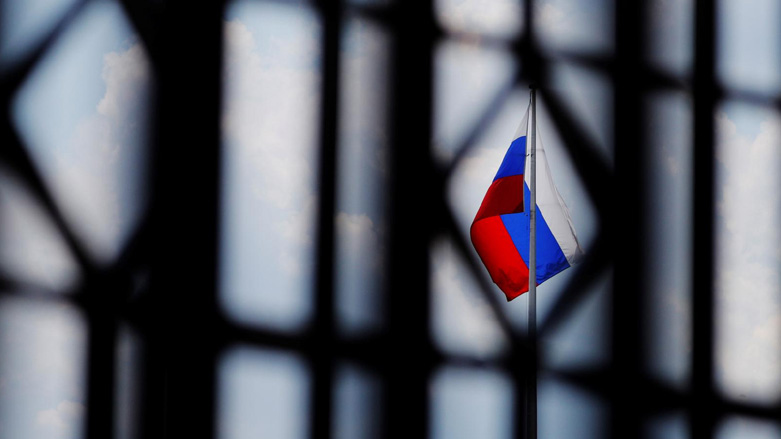US slams Iran and Russia for chemical weapons programs

WASHINGTON DC (Kurdistan24) – Amb. Kenneth Ward strongly criticized Iran and Russia on Thursday for maintaining chemical weapons programs, in violation of the Chemical Weapons Convention to which they are both signatories.
Ward, the US Permanent Representative to the Organization for the Prohibition of Chemical Weapons (OPCW), addressing that organization, cited Iran and Russia for their own chemical weapons programs. He also criticized their support for Damascus, which, he said, is “enabling Syria’s chemical weapons use by shielding the Assad regime from consequences in international fora.”
Turning to Iran, Ward explained that the US “has had longstanding concerns that [it] maintains a chemical weapons program that it [has] failed to declare to the OPCW,” including a facility for filling munitions with chemical weapons.
After 2011, when Col. Muammar Qaddafi was ousted as ruler of Libya, it was learned that Tehran had earlier provided chemical weapons to Tripoli.
Libya’s post-Qaddafi government discovered “chemical-filled artillery projectiles and aerial bombs that Iran transferred to Libya,” Ward told the OPCW.
Qaddafi was supposed to have declared and destroyed all of Libya’s chemical weapons. On December 19, 2003, he made a surprise announcement that he was ready to relinquish all elements of his proscribed Weapons of Mass Destruction programs. His declaration followed, by a mere six days, the capture of Saddam Hussein by US forces, who discovered the ousted Iraqi dictator hiding in a hole in the village of al-Dawr, just outside of Tikrit.

Libya’s chemical weapons program, as declared by the regime in 2004, was huge. It acknowledged having produced over 24 metric tons of mustard gas and being in possession of nearly 1,400 metric tons of sarin gas precursors, along with 3,600 unloaded chemical weapons munitions.
Seven years later, as unrest rocked the country, only half of Libya’s declared chemical material had been destroyed. After Qaddafi was ousted, yet more chemical weapons material, including the munitions from Iran, was discovered.
Ward also strongly criticized Russia for its use of the novichok nerve agent last March in an attempt to assassinate Sergei Skripal, a former Russian military intelligence officer, who became a British double agent; spent six years in a Russian prison; and in 2010, was expelled to the UK in a spy swap.
Ward noted that despite having claimed to have destroyed its chemical weapons stockpile in 2017, Russia subsequently used a “military grade nerve agent” in its attempt to kill Skripal. He charged that Moscow continues to maintain a chemical weapons program (in March, the British Foreign Secretary spoke similarly, warning that Russia had been “creating and stockpiling” nerve agents over the past decade.)
Paul Davis, now a Senior Fellow at Soran University, whose career began in the Army training US troops on how to protect themselves from chemical and biological attack, complained to Kurdistan 24 about the complacency of Americans regarding such threats.
They have “absolutely no concept” of chemical weapons and “what they can do,” Davis said. “They haven’t experienced such an attack in their own lifetimes, and they pay no attention to history.”
Indeed, Davis recounted his own experience with US soldiers in the 1980s. At first, they didn’t take seriously the training they were receiving in the use of protective masks.
So one trainer told them, “You have to realize what this chemical weapon is. You can’t see it, smell it, taste it or feel it, but it will kill you in the most horrible way possible.”
“That got their attention,” Davis remarked, “and I used that line myself.”
Det. Sgt. Nick Bailey was one of three British policemen sent to Skripal’s home, after he and his daughter, visiting from Moscow, were found seriously ill on a park bench. All three policemen wore protective gear, but, somehow, Bailey’s skin came into contact with the novichok, which had been smeared on the door handle of Skripal’s house, and he began feeling ill within hours.
British authorities had yet to identify the source of the poison, and Bailey, returning to his own home later that day, inadvertently contaminated it with novichok.
On Thursday, Bailey told the BBC how the event had upended his life. In the process, he highlighted the extreme danger posed by such material.
Bailey and his family have been obliged to move out of their house. It is contaminated, along with everything in it, by the nerve agent.
“Not only did we lose the house,” Bailey said, “we lost all of our possessions, including everything the kids owned. We lost all that—the cars, we lost everything.”
Of course, it could have been worse. All three individuals poisoned in March received intensive, first-class medical care and survived (although one person died in a later, related event.) In the case of an attack aimed at causing mass casualties, however, providing such intensive care to thousands of people would, almost certainly, be impossible, and the number of fatalities would be very high.
